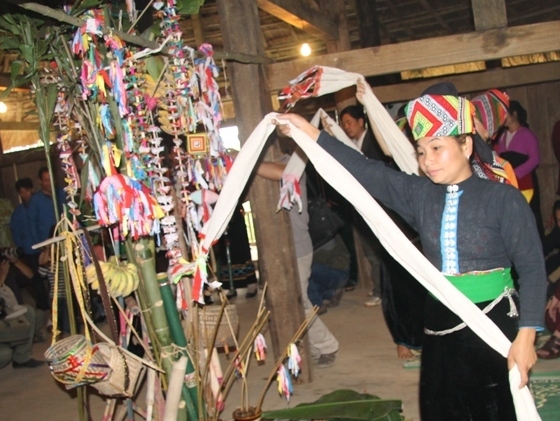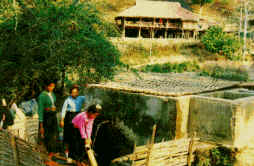The La Ha
10:34 AM 22/01/2016 Views: 6730 PrintThe La ha have a population of about 1,400 persons, living in Son La and Lao Cai provinces. They are also called Phlao and Khla. Their language belongs to the Kadai Group. They chiefly live on slash-and-burn farming in the nomadic pattern. Picking and gathering are more frequent than hunting and fishing. Nowadays, many villages cultivate rice in submerged fields and build embankments to protect the soil from erosion. Fertilizer has been used at some places. Apart from pig and poultry raising, cattle breeding begins to develop to ensure draught power.
The La ha grow cotton but are not familiar with weaving. They barter cotton for cloth made by the Thai and so dress in the same fashion as the Black Thai.
There are about a dozen or more houses in a village. Houses are built on stilts, with two entrance doors and ladders at both ends. A door is reserved for guests and the other for family life.
Young boys and young girls are free to seek love, and marriage is not forced by parents but must have their consent. To make love, the young boy visits the young girl at her house, and plays the flute and the two-string violin and sings before entering into normal conversation. After the marriage proposal, it he bride's family does not return the presents brought by the match-maker of the bridegroom's family, a ceremony is held for the bridegroom's matrilocality. The bridegroom has to live in the bride's family from 4 to 8 years before wedding is carried out. The bride then joins her husband's family and takes his family name
Old customs rule that the dead person is buried along with money and paddy rice. The La ha believe there are supernatural forces including spirits of the forest, the water, the mist and the house. Each person has 8 souls, and after a normal death, they become the spirts of the house or the terraced fields. In each family, only the soul of the father turned into the spirit of the house after his death is worshipped. Every year, when ban flowers blossom, thanks-givings are celebrated in every family in honor of parents.





